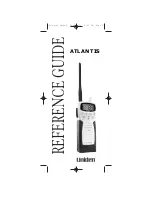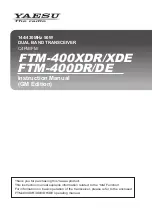
DMX Manual
PRODUCT MANUAL
Wireless DMX512 Transmitter/Receiver
DESCRIPTION
Our
Wireless Transmitter/Receiver is used in any LED lighting installation that requires
the use of DMX technology for lighting control. Until now, any DMX enabled LED
lighting fixture, had to be wired with DMX cable in order to control the lights. This
becomes a problem when there are long distances between the control system and
the lights. Using
our
DMX Transmission and Receiver System, DMX enabled lights can be
controlled easily up to 2100 feet away. The unit has 16 different selectable ID Groups,
which can be easily selected in order to have many units working in the same
environment without interfering each other. This is especially useful when there are big
installations being done which require many channels or DMX units to work in different
configurations.
How to use the unit:
This unit can be used as a Transmitter or Receiver. In order to select which mode you want
to use, (transmitter or receiver), you just have to plug a 3 pin XLR compatible DMX 512
cable in the back of the unit (fig. 1). If you wish to use the unit as a Transmitter, you would
use the DMX IN port at the back of the unit. If you wish to use the unit as a receiver, you
will have to use the DMX Out port on the back of the unit.
Front of Transmitter/Receiver
Back of Transmitter/Receiver
Essential Product Features
• Can Be Used As Transmitter Or Receiver
• Can Be Used As A Data Repeater Over Long Distances
• 2.4Ghz ISM Transmission Technology
• (2)x(8) Bit LCD Backlit Display
• Four Output Power Levels
• Max Transmission Distance 2100 Feet Un-Obstructed
• 126 Frequency Hopping Auto Selection And Channel Lock
• Up To (16) Different ID Groups For Big Installations
• Max Transmitting Power 20DBM
• Receiving Sensitivity: -94DBM
• DMX Signal Terminal Three Pin Female Male XLR (fig. 1)
Once the unit senses a DMX signal coming in, or a LED DMX enabled fixture
connected to the DMX OUT, the unit will configure itself as a receiver or as a
transmitter. (See figure1)
1. Connect power here with the supplied Power Adaptor.
2. DMX IN Port
3. DMX Out Port
4. Antenna
INSTRUCTION
Once you have decided how you are going to use the unit (As a receiver or trans-
mitter) we now have to configure 2 options on the front of the unit:
1. Power Level: The unit has four available power levels: (0), (1), (2), (3). Level (3) is the
most powerful transmission mode. Ideally you should always choose (0) as initial power
selection. If the configuration does not work, then increase power output to (1), then (2)
and finally to (3). (see fig. 2)
2. ID Channel: This Unit has (16) different ID Groups. The reason: depending on the con-
figuration, you may wish to have many Wireless DMX Transmitter/Receiver units working
in the same setup, with no interference between units.
Example:
Imagine you wish to have two independent DMX controllers in the same setup, each con
-
trolling different DMX enabled Lights. We would use this setup: Two DMX Wireless Trans-
mitters the first with Group ID 1 and the second one with Group ID 2; on the other side of
the setup, where the DMX enabled Lights are, we would have two Wireless Receiver units,
Group ID 1 and Group ID 2.
This will enable us to have two independent systems working together in the same setup,
without interfering with one another.
Fig. 1
DC INPUT
DC 9V-12V
300mA Min
1
2
3
4
DMX IN
DMX OUT
ANT
BACK VIEW
SolidApollo.com
DMX Transmitter/ Receiver




















